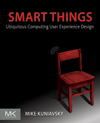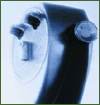In a 1996 essay (Word document) Mark Weiser, the person who coined the term ubiquitous computing and who really defned the space, predicts:
The "Smart House" of 1955 dared to put a TV and a telephone in every room. And the "Smart House" of 2005 will have computers in every room. But what will they do?
I have yet to see a good consumer-oriented kitchen computing device, and we still mostly have dumb toilets. So is the revolution in personal ubicomp? Did the jump go from computers sitting on desks to intimate computing? iPods and cameraphones are way more popular than computers in the kitchen.
That said, it's only January, but--as always with Weiser--it's good to go back and see what he was thinking.
We will dwell with these computers, whose presence we will ignore most of the time, and they will provide us with constant clues about our environment, our loved ones, our own past, the objects around us and the world beyond our home. Computers will act like books, windows, walks around the block, phone calls to relatives. They won't replace these, but augment them, make them easier, more fun.
And, finally, some advice against focusing on technology, when it's not the technology that's interesting, it's the distractions it removes that--in his, and my view--provides the ultimate value:
We become smarter as we put our roots deeper into what is around us. The house of the future will become one giant connection to the world-- quietly and unobtrusively, as naturally as we know it is raining, or cold, or that someone is up before us in the kitchen making breakfast.Ubiquitous computing just might help to
free our minds from unnecessary work, and
connect us to the fundamental challenge
that humans have always had:
to understand the patterns in the
universe and ourselves within them.



